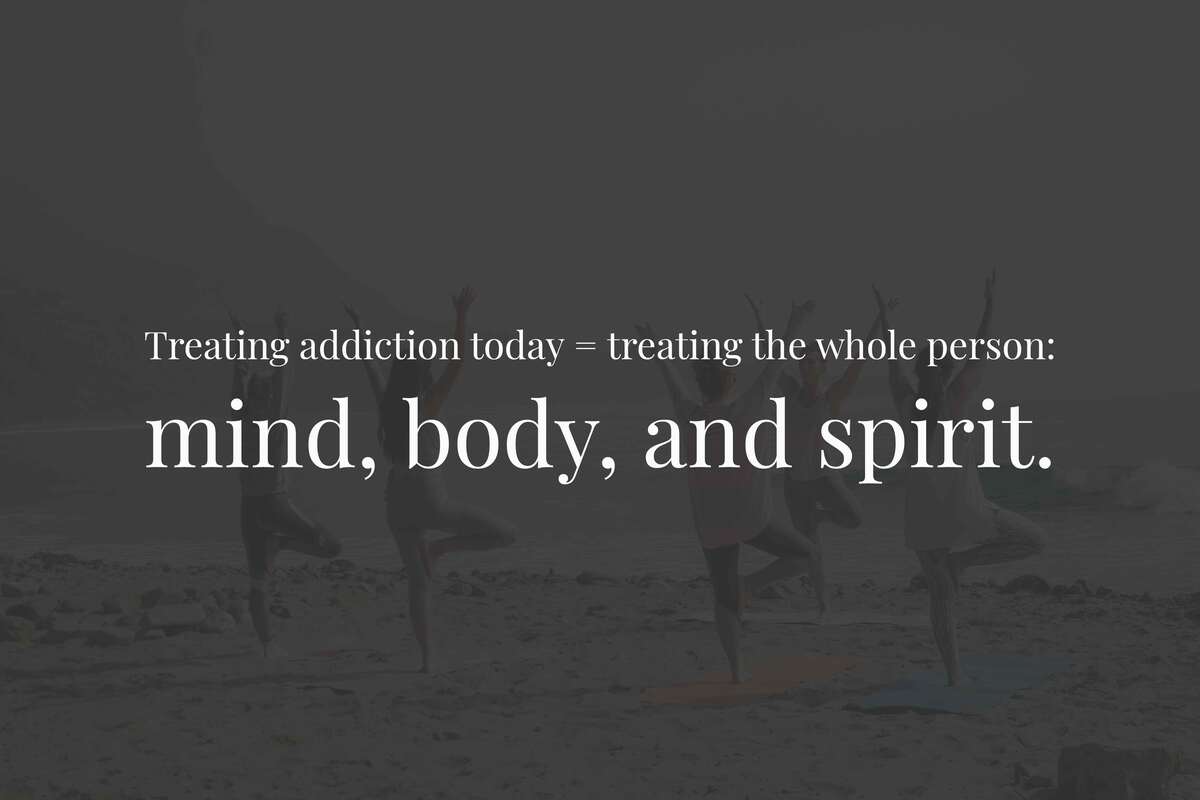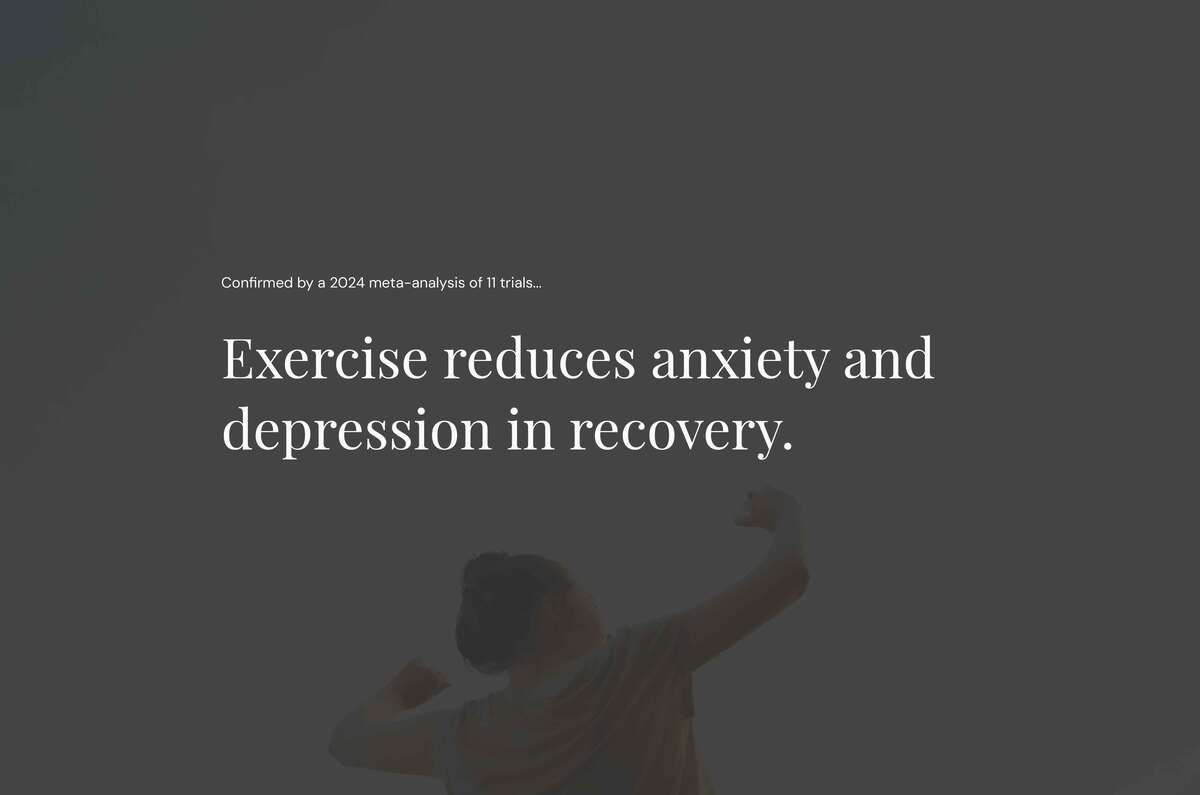Treating addiction today often means treating the whole person: mind, body, and spirit, not just the substance use. Integrated care models are on the rise, especially in California. For example, Brain Health USA in Los Angeles blends psychotherapy, medication management, and holistic practices. Their program includes yoga, mindfulness meditation, art therapy, and music therapy to support overall well-being in recovery [1]. This shift reflects a broader recognition that addiction and mental health are deeply intertwined, and that practices like yoga and meditation can complement traditional treatments by addressing the emotional and physiological roots of substance use [1].

Yoga Therapy in Addiction Treatment
Yoga therapy has become a foundation of many holistic recovery programs. Unlike general exercise, yoga combines physical postures, breathwork, and mindfulness, which together support emotional regulation and nervous system balance. Clinical studies confirm its impact. Harvard researchers report that yoga improves anxiety and depression by altering brain structure and function. Imaging studies show increased thickness in the cortex and hippocampus, regions involved in memory, focus, and emotional control, in yoga practitioners compared to non-practitioners [2].
Yoga also helps regulate neurochemistry. It reduces stress hormones like cortisol and boosts feel-good neurotransmitters such as GABA, which promotes calm and relaxation [2]. These effects are especially beneficial during early recovery, when emotional dysregulation and stress are common relapse triggers.
In practice, yoga has been shown to improve psychological outcomes among people in recovery. A recent feasibility study in India added an 8-week yoga counseling module to standard addiction treatment. Participants showed significant improvements in psychological health and overall quality of life compared to baseline [3]. Another randomized trial among men in residential rehab found that daily yoga sessions led to major reductions in stress, anxiety, and depression [4].
Yoga is typically adapted in treatment centers to match clients’ needs and mobility levels. Instructors may offer trauma-informed yoga, restorative poses, or breath-focused sequences. These sessions not only build physical strength and self-awareness but also serve as emotional anchors during recovery.

Mindfulness and Meditation for Craving and Relapse
Mindfulness and meditation therapy are increasingly integrated into addiction treatment, with growing support from neuroscience. Studies show that mindfulness alters brain activity in areas responsible for emotion regulation and stress response. Meditation practices such as loving-kindness and body scanning have been shown to improve self-awareness, reduce anxiety, and lower reactivity [5].
One widely studied model is Mindfulness-Based Relapse Prevention (MBRP). In a 2024 randomized controlled trial of young women recovering from methamphetamine use, participants who completed four weeks of MBRP showed higher mindfulness and significantly reduced drug cravings compared to controls [6].
More compellingly, a large-scale 2025 clinical trial evaluated the addition of trauma-informed mindfulness to medication-assisted treatment for opioid use disorder. Patients who received mindfulness training along with buprenorphine reported a 67 percent drop in cravings, much larger than the 44 percent reduction seen in those receiving standard support alone [7]. These findings point to meditation as a powerful tool for reinforcing long-term recovery.
Treatment programs may incorporate meditation in group therapy, daily routines, or individual coaching. Sessions often include guided breathing, mindful walking, or body awareness exercises. Importantly, these practices are accessible and inexpensive, making them scalable across inpatient, outpatient, and community settings.

Wellness Integration: Movement, Nutrition, and Creative Therapies
Beyond yoga and meditation, many holistic programs emphasize broader wellness elements such as fitness, nutrition, and creative expression. Each contributes to physical healing and emotional regulation.
A 2024 meta-analysis of 11 clinical trials found that aerobic exercise significantly reduced anxiety and depression in people recovering from substance use disorders [8]. Exercise also improved cognitive function and motivation, factors closely linked to treatment adherence and relapse prevention.
Nutrition plays an underappreciated role. Substance use often leads to poor diet, nutrient deficiencies, and gut dysregulation, all of which can affect mood and craving. While research in this area is still emerging, clinicians recommend incorporating nutritional counseling to help stabilize recovery through balanced blood sugar, anti-inflammatory diets, and supplementation when necessary.
Creative therapies such as art, music, and dance offer emotional outlets beyond verbal processing. Programs like Brain Health USA include these therapies to support self-expression and community building in recovery [1]. Clients often report that engaging creatively helps manage stress and boosts self-esteem, key drivers of sustained sobriety.
- Exercise and movement: aerobic activities like jogging, cycling, or yoga are encouraged to boost endorphins, reduce anxiety and depression, and improve focus [8].
- Nutrition and sleep: counselors advise balanced diets and good sleep routines to stabilize mood and cognitive function.
- Creative therapies: art, music, or dance therapy helps patients express feelings and manage stress.
- Mind-body practices: tai chi, acupuncture, or massage may be offered to promote relaxation and physical wellness.

A Growing Evidence Base
Research continues to validate the role of holistic therapies in addiction care. Studies from 2024 and 2025 consistently show that yoga, meditation, and related wellness interventions improve psychological well-being, reduce cravings, and support better retention in treatment [3][6][7][8]. Brain imaging and physiological data back these outcomes, revealing real shifts in brain structure, hormone levels, and emotional regulation mechanisms [2][5].
Holistic practices also hold unique promise for people with co-occurring disorders. PTSD, anxiety, and depression are common among those with substance use disorders, and mind-body approaches can help regulate the underlying symptoms without adding pharmacological load.
In California, many programs have begun integrating these modalities into standard care, responding both to research findings and patient demand. Listings of holistic rehabs have surged in recent years, reflecting a broader trend toward full-spectrum healing [9].

Conclusion
Addiction recovery is no longer just about detox and therapy. A growing body of research affirms that treating the whole person, physically, emotionally, and mentally, leads to stronger outcomes. Yoga, meditation, exercise, and creative engagement are more than supplemental tools. They are active ingredients in modern recovery. For patients and providers alike, this holistic approach offers not only better outcomes but deeper healing.
References
- Brain Health USA. “Bridging Substance Abuse and Mental Health in LA.” Mar 18, 2024.
- Harvard Health Publishing. “Yoga for Better Mental Health.” Apr 29, 2024.
- Ramsahaye AY, et al. “Yoga-Based Counseling Module as an Integrated Yoga Therapy to Manage Substance Use Disorder.” Indian Journal of Science and Technology, 2024; 17(27): 2865–2872.
- Sreelatha S, et al. “Effectiveness of Yoga on Stress, Anxiety, and Depression in Male Drug Rehabilitation Patients.” International Journal of Yoga, 2023; 16(2): 100–106.
- Saez I, et al. “Meditation Induces Changes in Brain Areas Associated With Emotional Regulation.” Mount Sinai Newsroom, Jan 2025.
- Liu X, et al. “Mindfulness-Based Relapse Prevention for Methamphetamine Dependence: A Randomized Controlled Trial.” Frontiers in Psychiatry, Oct 2024.
- Schuman-Olivier Z, et al. “Mindfulness Training vs. Recovery Support During Buprenorphine Treatment: A Randomized Clinical Trial.” JAMA Network Open, Jan 2025.
- Zheng Y, et al. “Effect of Physical Exercise on Emotional and Cognitive Levels in Substance Use Disorder.” Frontiers in Psychology, 2024; 15: 1348224.
- Recovery.com. “50 Best California Holistic Rehabs.” Jan 2024.



